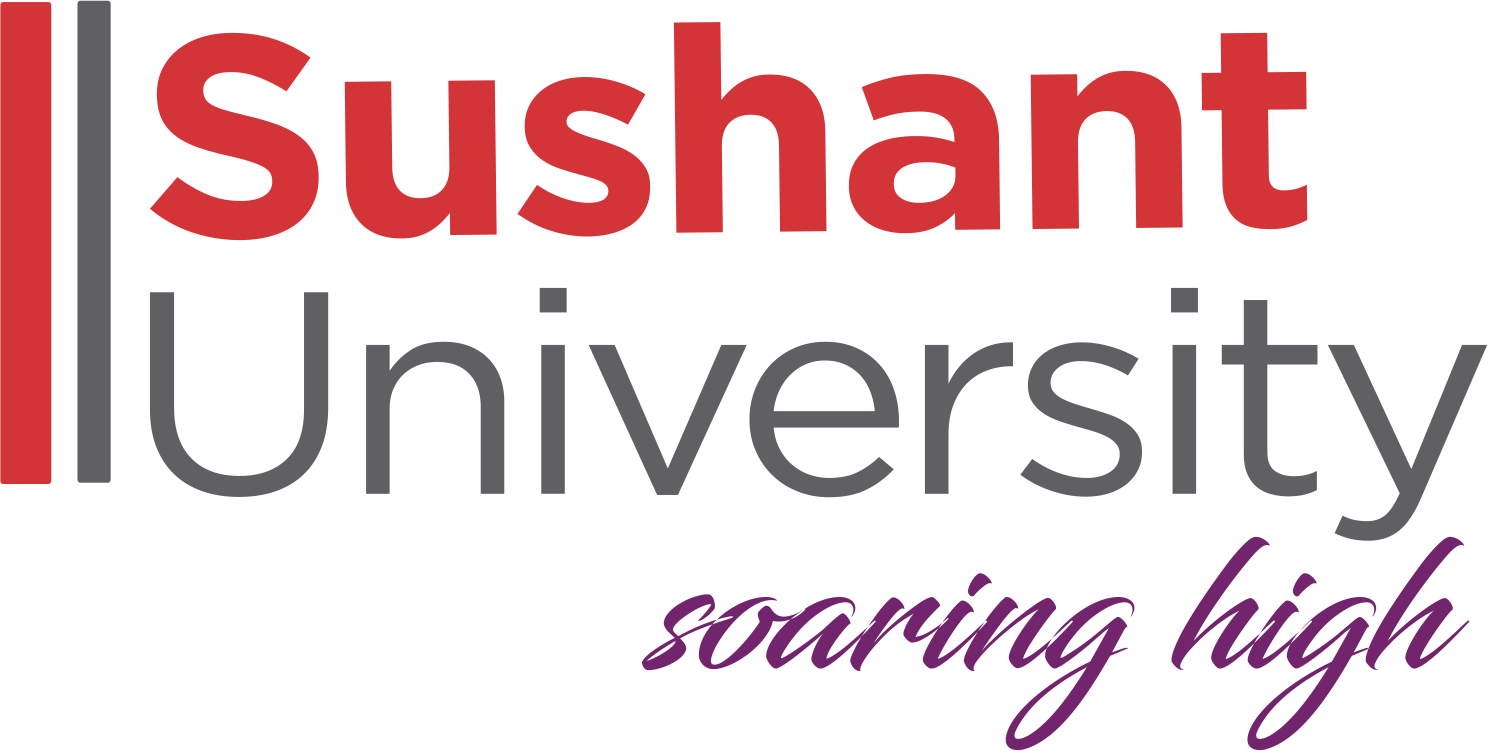PEDAGOGY
In the times of Covid-19, when most of the educational institutions closed, Sushant University continued with the most advanced e-learning mechanisms (TCS ion, Google Classroom, Meet, Blue Jeans, Go to webinar, WebEx). The best learning e-portals helped disseminate educational materials as well as provided a platform for all educational actors to communicate within the context of teaching and learning. We developed a system that allows students to take control of their own learning environment.
- Classroom lectures by well qualified and experienced faculty.
- Court Room Exercise (CRE) as class projects with an emphasis on researching, in depth analysis of precedents and enhancing oratory skills so as to familiarize students with the court room atmosphere long before their actual arrival on the legal scene.
- Case studies for analysing past history and trends including present case studies.
- Regular workshops by distinguished Advocates, Academics, Managing Partners and Associates from National and International Law Firms on diversified legal and business issues of contemporary significance.
- Getting them to see through problems and hypotheticals how a seemingly minor change in the facts can produce a change in the outcome.
- Teaching them case analysis — how to dissect a case, breaking it down into discrete components (facts, issue, precedent, rule, application, holding) in order to discern what the court is actually doing.
- Exposing them to ethical and professional responsibility issues that lurk beneath the surface of the cases.
- Giving them practical exposure on how cases are actually litigated in the real world by providing them regular internship opportunities with reputed Law Firms, Multinationals, Consultancies, Insurance Companies, NGO’s, Publication Houses, and Media Houses etc.
- Giving them litigation-oriented skills through courtroom simulations that involve questioning a witness or arguing a motion
- Rigorous Moot Court training for students by Experts.
- Curriculum designed with a vision to implement NEP 2020 focusing on research and community involvement.
Academic Curriculum
Choice Based Credit System
The semester based CBCS is at the heart of the academic structure and has been in practice from the commencement of the University.University follows the Choice Based Credit System. Core and Optional Courses constitute 60% and 40% of total credits respectively as per the guidelines of BCI. Open electives (TDL) are available to students across the University thus promoting trans disciplinarity. We not only offer advanced courses but also advanced honors courses like IPR Law and Pharmacy, and Clean Energy and Sustainable Laws. We make sure that the courses offered by us cover the most sought-after areas such as IPR, Corporate Laws and Human Rights but also the most emerging trends in these areas. The process of continuous evaluation ensures improvement in soft skills of the students. The CBCS encompasses a plethora of opportunities for the students as under:
- Blended Learning: We have integrated all kinds of learning experiences for our students. Industry visits, court room assignments, online courses and empirical studies are facilitated and evaluated by our faculty. We have also been constantly trying to engage the students on several online learning platforms. Faculty and students have been engaged in this UGC Certified online learning platform.
- Clinical Legal Education: Clinical legal Education has long been our USP. The objective is to Bridging the gap between classroom pedagogy and Legal Practice. This has been done by a plethora of activities like Student Sensitization/ awareness sessions through Sushant Legal Aid Clinic, Adoption of Legal Care and Support Centre, compulsory summer internships, training workshops and so on.
- Peer tutor Programme: Good academic performer students are selected as peer tutors. Students needing help are identified by faculty and classroom counsellors. Senior students are affectively engaged as tutor for juniors who need help.
- Trans-disciplinary Learning: Open electives (TDL) are available to students across the University thus promoting trans disciplinarity. Law students can take up any TDL subject of their choice offered by other department.
- Soft Skills Training: The total component is divided into Internal (40) and External (60) components. The internal component is evaluated by projects, presentations, group discussions and so on. The process of continuous evaluation ensures improvement in soft skills of the students.
- Modern Language Courses: Sushant University has joined hands with an International Language learning platform BUSUU which has agreed to offer, as a special case, a pilot project under which, students would be given a free trial of the system for a limited period. Pursuant to this a foreign language learning centre has been established.
- Certification Courses: Two certificate courses for one month duration was offered by School of Law in Aug-Sept 2020. Ubiquitous Law: The Foundation Course; was introduced with the objective to familiarise the students starting their journey as a Lawyer with fundamental understanding of law. Good number of students enrolled for the courses and it became extremely popular.
- Value Added Programmes: We offer a plethora of value added programmes like Personality Development Programmes, Soft Skills Development Workshops and Community Development Projects.
- Faculty Mentoring: Faculty members are appointed as mentors for approximately 15 students right from the first semester. The focus is overall development of students which includes professional guidance, career advancement and course related guidance.
- Industrial Mentorship: A group of 10 to 15 students are assigned one industry mentor. Industry mentors are chosen from a list of well accomplished individuals in the legal sector with varied roles.








